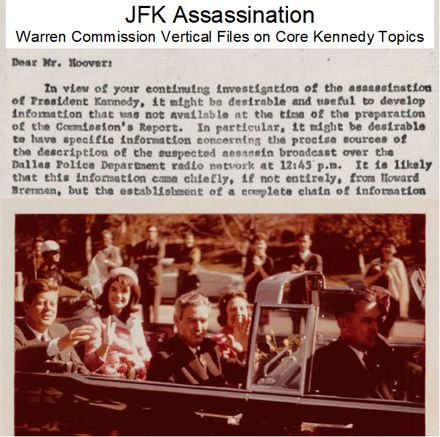Starting from:
$12.95
Home
Intell Espionage
Guatemala 1954 Coup - Operation PBSuccess CIA Files & State Department Transcriptions - Download
Guatemala 1954 Coup - Operation PBSuccess CIA Files & State Department Transcriptions - Download
Guatemala 1954 Coup - Operation PBSuccess CIA Files & State
Department Transcriptions
2,846 pages of CIA documents and State Department transcriptions covering the Agency's involvement in the 1954 coup in Guatemala to overthrow President Jacobo Arbenz Guzman.
PBSuccess was the code name for a covert operation carried out by the U.S. Central Intelligence Agency (CIA) that deposed the democratically elected Guatemalan President Jacobo Árbenz Guzman and ended the Guatemalan Revolution of 1944–1954. Guzman was seen as a serious Communist threat after confiscating two-thirds of United Fruit Co.'s 332,000 acres and legalizing the Communist Party.
CIA Files
1,937 pages of CIA files covering the 1954 Guatemalan Coup.
These records encompass the events and circumstances causing U.S. policymakers to plan the overthrow of the Guatemalan Government in June 1954 as Cold War tensions mounted between the two superpowers; CIA plans for and execution of the covert action; the outcome; and CIA historical analysis of CIA's performance and impact of the coup. The collection includes reviews of the event by CIA historians, administrative memos regarding operational plans and internal approvals; operational cable traffic; and summaries of the Sherwood tapes used for propaganda purposes.
"The essential point of assassination is the death of the subject," a short and succinct line from a CIA memo in the training file for PBSuccess, with the subject head, "A Study of Assassination."
The files show that "hit lists" were compiled and the CIA began training Central American assassins to kill political and military Communist leaders. According to CIA review the assassination plans were never carried out and never formally approved by top State Department or CIA officials, or the White House. President Guzman resigned on June 27, 1954, two weeks after U.S. supported rebels invaded Guatemala. The files show that rebel leader Castillo Armas, who took the place of Arbenz, gave the CIA a list of 58 people to be assassinated.
In 1953, the CIA drew up plans for "K" groups, or assassin teams, to work with sabotage groups. According to a January 11, 1954 cable the CIA sent 20 silencers for .22-caliber rifles to rebels training in Honduras. In March 1954, the CIA drew up criteria for assassination targets. Files include information about "Nerve War" which included sending wooden coffins, hangman's nooses and phony bombs to targets. "Here Lives a Spy" and "You have only 5 Days" were painted on their houses.
The files include an instructional guide on assassination titled, "A Study of Assassination." The document offers descriptions of procedures and assassination hints such as, "The simplest local tools are often much the most efficient means of assassination... A hammer, axe, wrench, screwdriver, fire poker, kitchen knife, lamp stand, or anything hard, heavy and handy will suffice." "...Puncture wounds of the body cavity may not be reliable unless the heart is reached... Absolute reliability is obtained by severing the spinal cord in the cervical region."
Department of State Foreign Policy Documents Transcriptions
3,145 pages in two volumes, with 920 pages directly covering Guatemala, of The Foreign Relations of the United States series. Foreign Relations of the United States, 1952–1954 Retrospective Volume Guatemala (1983) and Foreign Relations of the United States, 1952–1954 Volume IV The American Republics (2003).
The Foreign Relations of the United States series presents the official documentary historical record of major foreign policy decisions and significant diplomatic activity of the United States Government.
Foreign Relations of the United States, 1952–1954 Volume IV The American Republics (1983) - This volume presents documents on the major aspects of relations between the United States and the nations of Latin America. The first section records the main lines of United States policy within a general regional framework. The remainder and larger part of the volume presents documents on United States policy toward and relations with individual Latin American nations
Foreign Relations of the United States, 1952–1954 Retrospective Volume Guatemala (2003) - This volume is part of a sub-series of volumes of the Foreign Relations series that documents the foreign policy of the administrations of Harry S Truman and Dwight D. Eisenhower. It is a supplement to the 1983 publication of Volume IV, American Republics. Volume IV, covered both multilateral relations as well as bilateral relations for 20 American Republics, including Guatemala. The historian who collected and prepared that volume knew that the compilation on Guatemala as published was incomplete and flawed. The role of the Central Intelligence Agency in the ouster of Guatemala’s elected president, Jacobo Arbenz Guzmán, was not documented in the volume.
The historian responsible for the 1983 volume gained some access to CIA records of the operation. He inserted references to the covert operation into the Guatemala compilation, but they were denied in the declassification process. Despite internal debate, the Office of the Historian published the volume without the inclusion of a disclaimer indicating that the published documentation on Guatemala provided an incomplete and distorted history. Critical reviews of the compilation appeared in academic journals and major newspapers.
In the early 1990s, Directors of Central Intelligence officially acknowledged eleven covert actions during the early cold war years, including Guatemala. At the same time, Department of State historians gained fuller access to the CIA’s files on Guatemala. The 2003 volume is a product of improved access. The Central Intelligence Agency reviewed the volume for declassification in coordination with its review of documents on the Guatemala operation that was released to the National Archives.
The 2003 volume fills in many details about the role of the United States in Guatemala in the early 1950s. The CIA operation in Guatemala is an important instance of the use of covert action to implement U.S. foreign policy, and the 2003 volume provides a detailed account of that action. Because the focus of the volume is on a covert program, the documents published in the 1952–1954 American Republics volume are not reprinted here, but footnotes and editorial notes refer back to the more significant covert aspects covered in the volume published in 1983. The two volumes complement each other and should be read together for a full and comprehensive account.
The Department of State historian was convinced that the Central Intelligence Agency made all relevant documents available for this publication.
The 2003 volume is a retrospective volume on Guatemala, 1952–1954, is a documentary history of PBSUCCESS, the Central Intelligence Agency operation leading to the 1954 coup that removed President Jacobo Arbenz Guzmán from power. As such, this volume relies primarily on documents of the Directorate of Operations (DO) at the Central Intelligence Agency. Most of the DO documentation is in Job 79–01025A, a collection that includes extensive records for PBFORTUNE, an initial plan first considered in 1951 to oust Arbenz; PBSUCCESS, the plan as implemented; and PBHISTORY, the project to analyze and utilize documents of the Arbenz government. The majority of the documentation in Job 79–01025A is comprised of internal memoranda and cable traffic, especially telegrams to and from Central Intelligence Agency Headquarters (DIR cables), CIA Stations including Guatemala (GUAT cables), and PBSUCCESS Headquarters in Florida (LINC cables). Additionally, Job 79–01025A contains many Agency-generated internal memoranda and intelligence studies, most of it originating in the CIA’s Western Hemisphere Division.
Job 79–01025A also includes correspondence, memoranda, and cables to and from Central Intelligence Agency Headquarters, the Department of State, and the United States Embassy in Guatemala. The volume includes a few documents from the John Foster Dulles Papers at the Dwight D. Eisenhower Presidential Library, in addition to several reprints of documents published in the Guatemala compilation in Foreign Relations, 1952–1954, Volume IV, American Republics (1983). This retrospective volume supplements the earlier compilation on Guatemala for the Eisenhower administration and together the two volumes provide a comprehensive view of U.S. foreign policy toward Guatemala during 1952–1954, both as it was agreed upon in Washington and as it was implemented in Central America.
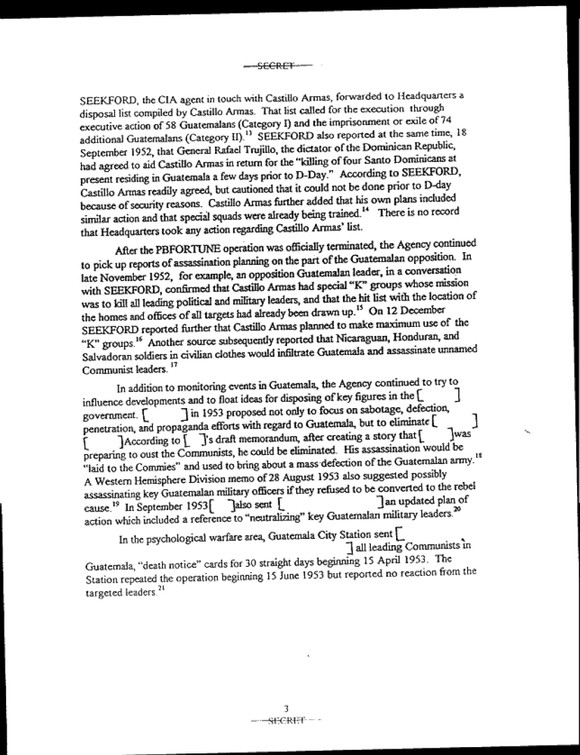
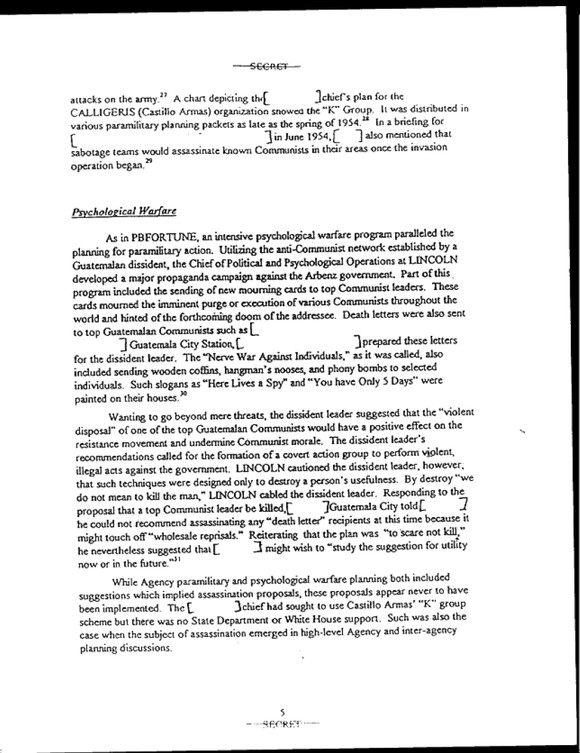

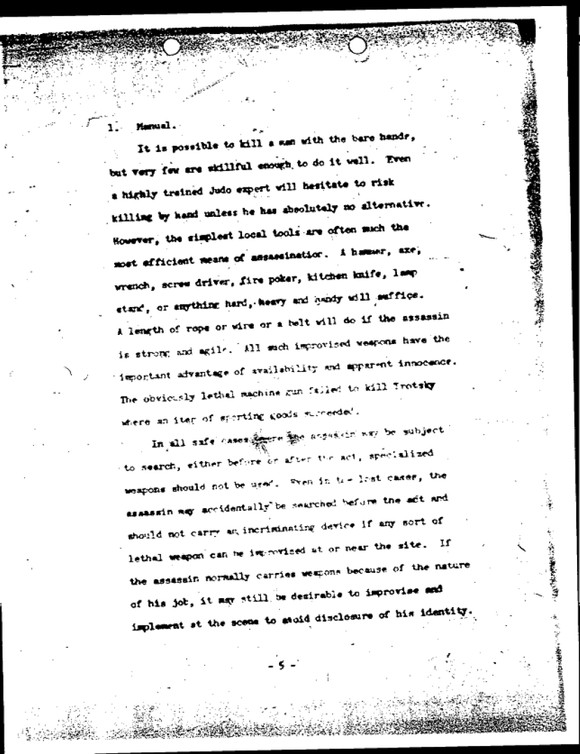
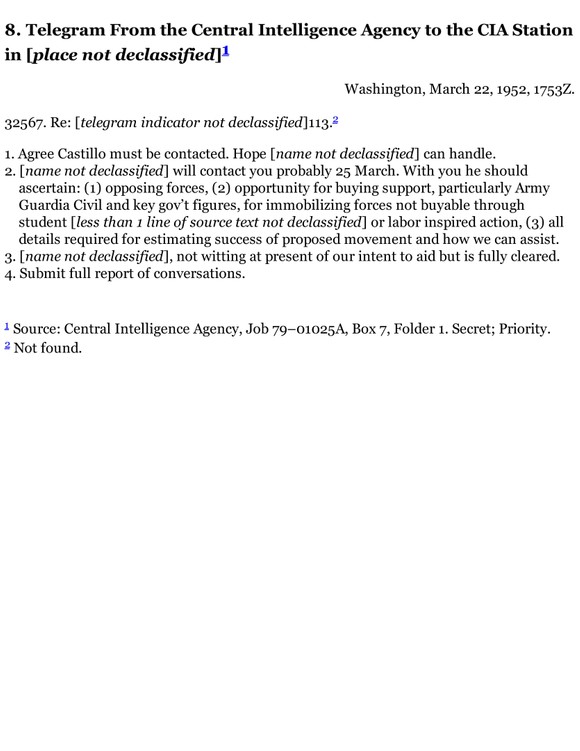
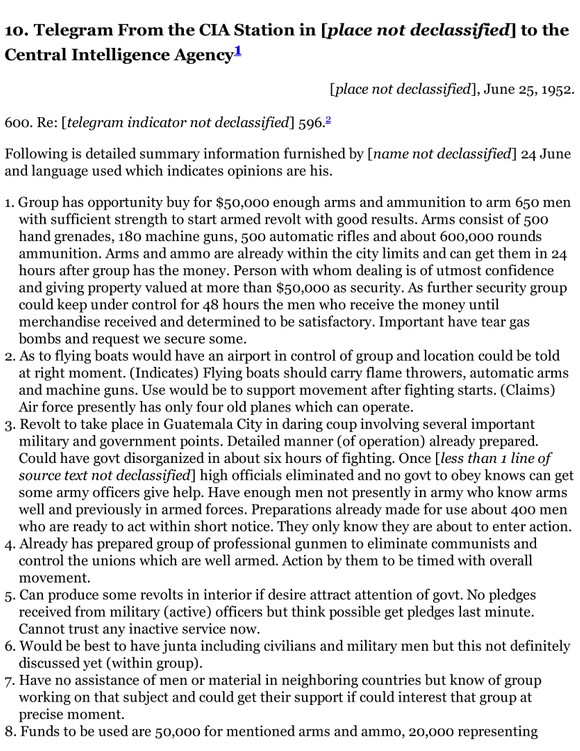
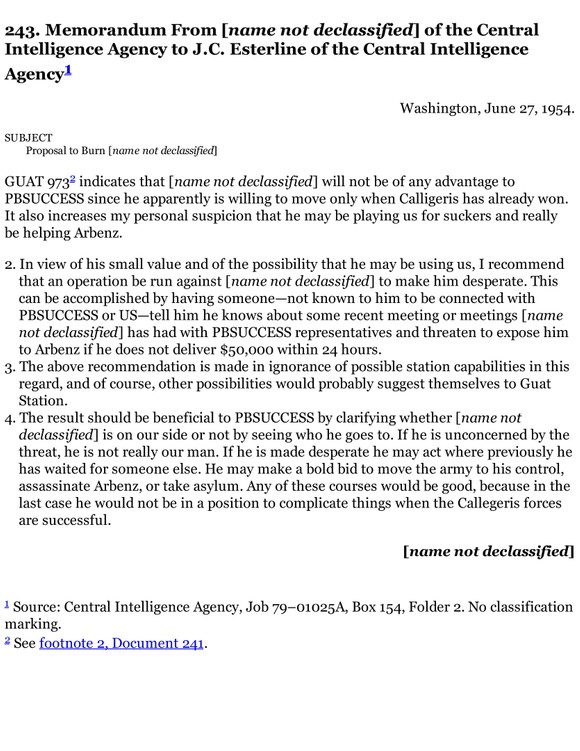
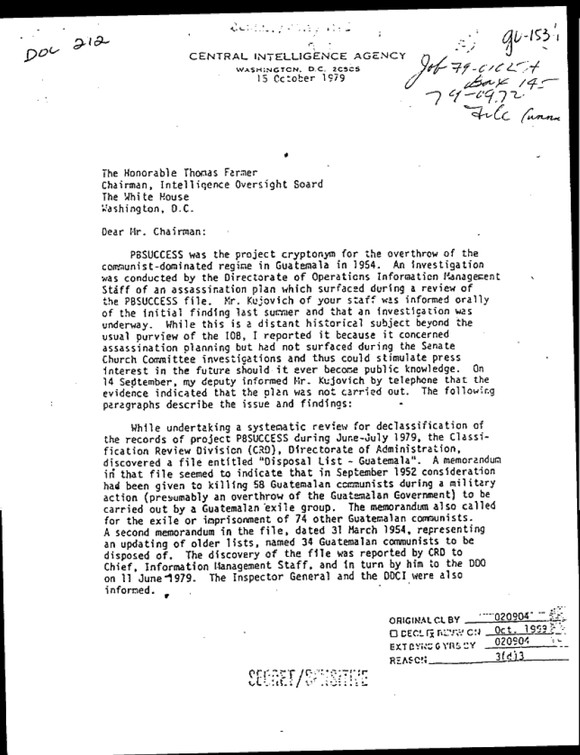
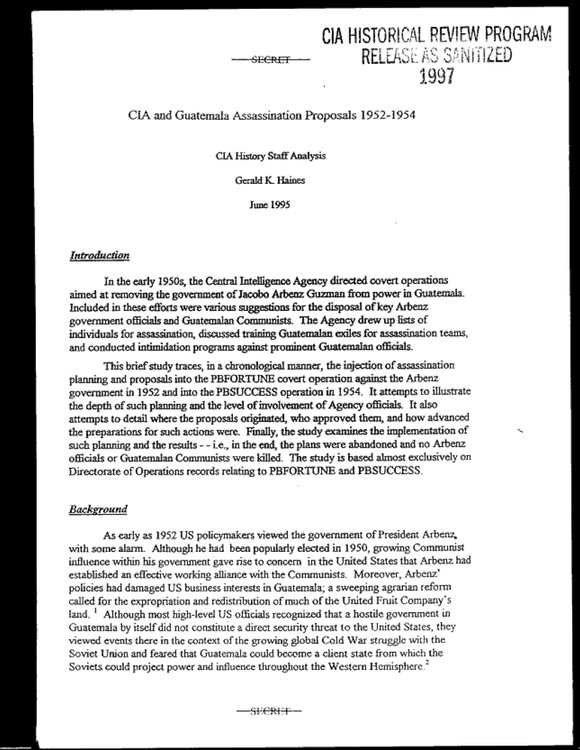
Department Transcriptions
2,846 pages of CIA documents and State Department transcriptions covering the Agency's involvement in the 1954 coup in Guatemala to overthrow President Jacobo Arbenz Guzman.
PBSuccess was the code name for a covert operation carried out by the U.S. Central Intelligence Agency (CIA) that deposed the democratically elected Guatemalan President Jacobo Árbenz Guzman and ended the Guatemalan Revolution of 1944–1954. Guzman was seen as a serious Communist threat after confiscating two-thirds of United Fruit Co.'s 332,000 acres and legalizing the Communist Party.
CIA Files
1,937 pages of CIA files covering the 1954 Guatemalan Coup.
These records encompass the events and circumstances causing U.S. policymakers to plan the overthrow of the Guatemalan Government in June 1954 as Cold War tensions mounted between the two superpowers; CIA plans for and execution of the covert action; the outcome; and CIA historical analysis of CIA's performance and impact of the coup. The collection includes reviews of the event by CIA historians, administrative memos regarding operational plans and internal approvals; operational cable traffic; and summaries of the Sherwood tapes used for propaganda purposes.
"The essential point of assassination is the death of the subject," a short and succinct line from a CIA memo in the training file for PBSuccess, with the subject head, "A Study of Assassination."
The files show that "hit lists" were compiled and the CIA began training Central American assassins to kill political and military Communist leaders. According to CIA review the assassination plans were never carried out and never formally approved by top State Department or CIA officials, or the White House. President Guzman resigned on June 27, 1954, two weeks after U.S. supported rebels invaded Guatemala. The files show that rebel leader Castillo Armas, who took the place of Arbenz, gave the CIA a list of 58 people to be assassinated.
In 1953, the CIA drew up plans for "K" groups, or assassin teams, to work with sabotage groups. According to a January 11, 1954 cable the CIA sent 20 silencers for .22-caliber rifles to rebels training in Honduras. In March 1954, the CIA drew up criteria for assassination targets. Files include information about "Nerve War" which included sending wooden coffins, hangman's nooses and phony bombs to targets. "Here Lives a Spy" and "You have only 5 Days" were painted on their houses.
The files include an instructional guide on assassination titled, "A Study of Assassination." The document offers descriptions of procedures and assassination hints such as, "The simplest local tools are often much the most efficient means of assassination... A hammer, axe, wrench, screwdriver, fire poker, kitchen knife, lamp stand, or anything hard, heavy and handy will suffice." "...Puncture wounds of the body cavity may not be reliable unless the heart is reached... Absolute reliability is obtained by severing the spinal cord in the cervical region."
Department of State Foreign Policy Documents Transcriptions
3,145 pages in two volumes, with 920 pages directly covering Guatemala, of The Foreign Relations of the United States series. Foreign Relations of the United States, 1952–1954 Retrospective Volume Guatemala (1983) and Foreign Relations of the United States, 1952–1954 Volume IV The American Republics (2003).
The Foreign Relations of the United States series presents the official documentary historical record of major foreign policy decisions and significant diplomatic activity of the United States Government.
Foreign Relations of the United States, 1952–1954 Volume IV The American Republics (1983) - This volume presents documents on the major aspects of relations between the United States and the nations of Latin America. The first section records the main lines of United States policy within a general regional framework. The remainder and larger part of the volume presents documents on United States policy toward and relations with individual Latin American nations
Foreign Relations of the United States, 1952–1954 Retrospective Volume Guatemala (2003) - This volume is part of a sub-series of volumes of the Foreign Relations series that documents the foreign policy of the administrations of Harry S Truman and Dwight D. Eisenhower. It is a supplement to the 1983 publication of Volume IV, American Republics. Volume IV, covered both multilateral relations as well as bilateral relations for 20 American Republics, including Guatemala. The historian who collected and prepared that volume knew that the compilation on Guatemala as published was incomplete and flawed. The role of the Central Intelligence Agency in the ouster of Guatemala’s elected president, Jacobo Arbenz Guzmán, was not documented in the volume.
The historian responsible for the 1983 volume gained some access to CIA records of the operation. He inserted references to the covert operation into the Guatemala compilation, but they were denied in the declassification process. Despite internal debate, the Office of the Historian published the volume without the inclusion of a disclaimer indicating that the published documentation on Guatemala provided an incomplete and distorted history. Critical reviews of the compilation appeared in academic journals and major newspapers.
In the early 1990s, Directors of Central Intelligence officially acknowledged eleven covert actions during the early cold war years, including Guatemala. At the same time, Department of State historians gained fuller access to the CIA’s files on Guatemala. The 2003 volume is a product of improved access. The Central Intelligence Agency reviewed the volume for declassification in coordination with its review of documents on the Guatemala operation that was released to the National Archives.
The 2003 volume fills in many details about the role of the United States in Guatemala in the early 1950s. The CIA operation in Guatemala is an important instance of the use of covert action to implement U.S. foreign policy, and the 2003 volume provides a detailed account of that action. Because the focus of the volume is on a covert program, the documents published in the 1952–1954 American Republics volume are not reprinted here, but footnotes and editorial notes refer back to the more significant covert aspects covered in the volume published in 1983. The two volumes complement each other and should be read together for a full and comprehensive account.
The Department of State historian was convinced that the Central Intelligence Agency made all relevant documents available for this publication.
The 2003 volume is a retrospective volume on Guatemala, 1952–1954, is a documentary history of PBSUCCESS, the Central Intelligence Agency operation leading to the 1954 coup that removed President Jacobo Arbenz Guzmán from power. As such, this volume relies primarily on documents of the Directorate of Operations (DO) at the Central Intelligence Agency. Most of the DO documentation is in Job 79–01025A, a collection that includes extensive records for PBFORTUNE, an initial plan first considered in 1951 to oust Arbenz; PBSUCCESS, the plan as implemented; and PBHISTORY, the project to analyze and utilize documents of the Arbenz government. The majority of the documentation in Job 79–01025A is comprised of internal memoranda and cable traffic, especially telegrams to and from Central Intelligence Agency Headquarters (DIR cables), CIA Stations including Guatemala (GUAT cables), and PBSUCCESS Headquarters in Florida (LINC cables). Additionally, Job 79–01025A contains many Agency-generated internal memoranda and intelligence studies, most of it originating in the CIA’s Western Hemisphere Division.
Job 79–01025A also includes correspondence, memoranda, and cables to and from Central Intelligence Agency Headquarters, the Department of State, and the United States Embassy in Guatemala. The volume includes a few documents from the John Foster Dulles Papers at the Dwight D. Eisenhower Presidential Library, in addition to several reprints of documents published in the Guatemala compilation in Foreign Relations, 1952–1954, Volume IV, American Republics (1983). This retrospective volume supplements the earlier compilation on Guatemala for the Eisenhower administration and together the two volumes provide a comprehensive view of U.S. foreign policy toward Guatemala during 1952–1954, both as it was agreed upon in Washington and as it was implemented in Central America.









1 file (398.8MB)


